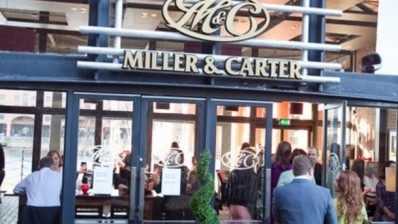Five things restaurateurs must consider ahead of the new Tips Bill

When the Employment (Allocation of Tips) Act comes into force next year, it will mark a seismic moment for the restaurant sector. The topic of tipping is one that has dogged the sector for years, with calls to introduce more robust laws related to gratuities and service charge stretching back to 2015 when, following revelations of several high-profile restaurant groups keeping all or part of the service charge added to bills, a Government consultation found that restaurant customers were overwhelmingly in favour of the tips they paid going to the people who served them.
In the intervening years, the topic has oft been debated in Parliament. The Conservatives pledged to tackle the issue of the unfair distribution of tips in its 2019 manifesto; while Labour set out plans last year to ensure employers allocate all tips, gratuities and service charge payments to workers in full, without any deductions apart from statutory taxes.
Fast forward to today and the Employment (Allocation of Tips) Act 2023 is the culmination to this long-running saga. Originally put forward as a private member’s bill by Conservative MP Dean Russell, the new law, which received Royal Assent back in May and is expected to come into force at some point next year, will make it unlawful for businesses to hold back service charges from their employees, ensuring staff receive the tips they have earned.
According to the Government, the overhaul of tipping practices is set to benefit more than two million UK workers across the hospitality, leisure and services sectors, with an estimated £200m a year going back into their pockets. Accompanying the act will be a new statutory Code of Practice, which is intended to provide businesses and staff with advice on how tips should be distributed. It is understood that this will be published towards the end of the summer, but while we wait for those finer details of the legislation, it’s important for restaurateurs across the country to start preparing now for when the law is introduced.
To help you hit the ground running, Restaurant has put together a list of five key points restaurateurs need to consider ahead of the Employment (Allocation of Tips) Act coming into force.
Begin budgeting now
One of the key drawbacks faced by operators as a result of the Employment (Allocation of Tips) Act is the additional costs they will face. This relates both to extra administration (principally relating to the increased record-keeping requirements), and to the fees and charges levied on tips and service charges paid by card, which operators will now be forced to meet. “Under the new law, 100% of the money paid by customers to staff as tips will need to be passed on to them,” explains Peter Davies, managing director and co-owner at WMT Troncmaster Services. “Up until now some business have legally used an element of the money to cover off card commissions and fees and bank charges, but the Government has made the decision to not allow that to continue. So, when businesses are beginning to plan budgets for 2024, they will now have to look at those costs as ones they either swallow internally or have to pass on to their customers.” According to Davies, based on an average charge of 2% and the figures contained within the Government’s Impact Assessment, the sector will face an annual bill of around £140m because of the changes. “It’s a significant amount of money,” he continues. “And businesses need to look at that, think about what they’re doing now, work out the cost to them, and make sure it’s considered within their 2024 budgets. That’s something they should be preparing for now.”
Get to grips with the Code of Practice
As things stand, the Employment (Allocation of Tips) Act sets out a number of broad red lines that restaurateurs will be required to follow. Alongside the stipulation that 100% of the money paid by customers to staff as tips is passed on to them, it also demands that larger groups not be allowed to pool tips across multiple sites. Additionally, workers will receive a new right to request more information relating to an employer’s tipping record, enabling them to bring forward a credible claim to an employment tribunal. However, there are many scenarios yet to be properly addressed within the legislation, and that is where the Code of Practice comes in. This document, which is expected to be published by the Government in the coming months, will offer a more defined set of standards and principles for businesses to follow when implementing the legislation and demonstrate how they can behave in a way that is fair and transparent. The Government is already on record as saying there won’t be a one-size-fits-all model for businesses to follow, and Davies notes that it’s not expected everywhere will have to run things in an identical fashion. “It is expected that business ‘have regard’ of the code,” he says. “So, it’s not that every business will have to slavishly follow every word of it, but they will have to make sure they are in the same space as it.”
To tronc or not to tronc?
Businesses not currently using a tronc system will need to decide if they want to or not before the Act comes into force as it may be difficult for a business to make a change under the new legislation. “Businesses that don’t currently run tronc need to seriously consider the pros and cons of using that service, as it could end up being a once and forever decision,” warns Davies. There is no requirement to use a tronc system under the legislation, and there are alternatives available, principally in the form of cashless tipping platforms. Established players within that space include EasyTip and Tip Pot, but the most prominent of them is TiPJAR [see boxout below]. Founded by James Brown of BrewDog, and backed by Alex Moore of Rosa’s Thai Cafe, Gary Dolman of Monzo and Simon Bocca formerly of Fourth, TiPJAR says it is 'on a global mission to bring transparent and fair digital tipping to the hospitality industry'. Through the platform, any tip paid by a customer digitally – either by card or smartphone – is equivalent to cash and is wholly owned by the staff themselves, by-passing the business and, therefore, the need to operate a tronc system; although the platform does now offer a SUPERTRONC functionality, which gives operators the option to run a tronc through TiPJAR and is built to be 100% compliant the new tipping laws. “As an operator, navigating new legislation can be challenging,” says Brown. “At TiPJAR, we embrace this opportunity to revolutionise service charges and tip management for businesses. Our platform simplifies the entire process, from collection to distribution, by connecting customers directly to staff. This not only ensures compliance and reduces your liability, but also empowers staff with a fair and transparent system that rewards excellent service.”
Consider a ‘service included’ approach
Rather than deal with either a tronc system or a cashless tipping platform, some operators are instead opting to do away with service charge and gratuities completely, in favour of a ‘service included’ model. This sees the restaurant move to an all-inclusive pricing structure, with no additions added to the bill, with staff paid a set monthly wage. Much has been said and written about the costs involved with making the switch to ‘service included’, with operators facing higher VAT bills, as well as bigger National Insurance and pension contributions, leading to some businesses that had previously scrapped service charge finding themselves having to reinstate it further down the line. Some, though, have successfully managed to make the model work for, including Mana in Manchester and Brawn in London, both of which removed service charge from their menus during the pandemic. More recently, Chantelle Nicholson’s Mayfair restaurant Apricity also opted for the model. “I always felt there were too many flaws with the tronc system,” says Nicholson (pictured below). “This way my staff know the money they have coming in as their wage each month, which is important if, further down the line, they want to get a bank loan or a mortgage. From my own experience, trying to get something like that when a good chunk of your income is discretionary is tough.” Nicholson concedes that the move to service included proved a costly consideration when drawing up her business plan for Apricity, but believes it was the right decision to make. “It’s worked for me and my staff, and from an ethical perspective I feel a lot more comfortable with my own business, which is really important.”
The agency worker issue
One area related to the legislation where concern has been raised is around the subject of agency workers. Generally, the rule of thumb with hospitality operators using agency workers is that they’re not paid tips or service charge, as there are often legal, employment and taxation problems with giving money to someone who isn’t an employee on a payroll. However, as it currently stands, agency workers are to be treated on an identical basis to directly-employed staff. During a Parliamentary debate on the bill prior to it receiving Royal Assent, Lord Mitchell questioned this fact, suggesting that agency rates have an implicit tipping share built into their daily fee and that if an agency worker also took a share of the tips they would, in effect, they get the benefit of the tip twice over. Davies voices similar concerns. “The new distortion that requires operators to pay tips to agency workers means those workers will be earning more, which then puts further pressure on the business with regards to their own staff. If they’re earning less, why would a worker want to be directly employed when they could instead be with an agency making more money?” There have been suggestions that the issue will be dealt with in the Code of Practice but, as noted above, the industry still awaits its publication.
Supplier comment: How TiPJAR is revolutionising tip management for modern businesses
TiPJAR is the industry-leading platform that revolutionizes tip management for modern businesses, providing seamless solutions for both tronc and direct cashless tipping. With our integrated platform, businesses can streamline their tip processes and empower their staff like never before.
For businesses utilizing tronc systems, TiPJAR offers a comprehensive solution that simplifies tip collection, attribution, and distribution. Our platform covers all aspects of tronc management, including HMRC reporting and compliance, ensuring businesses stay on the right side of the law while creating a fair and transparent environment for their staff.
In addition to tronc, TiPJAR excels in facilitating direct cashless tipping through integrations with various payment and rota providers. By seamlessly integrating into our clients' existing workflows, we enable customers to tip their favorite staff members with a single transaction, while the tips go directly to the deserving employees. Our platform acts as a channel-agnostic intermediary, effortlessly handling the tip distribution process, allowing businesses to focus on providing exceptional service.
With TiPJAR, businesses can unlock the full potential of their tip management processes. Our platform empowers employees by providing instant access to their tips, ensuring financial security and peace of mind. We go beyond traditional methods, offering innovative features like cross-team sharing of tips, fostering a sense of collaboration and fairness among staff members.
TiPJAR's commitment to compliance is unwavering. Our platform is designed to align with new legislation, providing businesses with a trustworthy and compliant solution for tip management. With TiPJAR, businesses can navigate the complexities of tip regulations with ease, reducing liabilities and ensuring a fair and transparent tipping ecosystem.
Join the thousands of businesses worldwide that have embraced TiPJAR as their go-to platform for comprehensive and efficient tip management. Experience the transformative power of TiPJAR, where tronc and direct cashless tipping converge to empower your staff, streamline operations, and drive growth.
For more information on TiPJAR, click here.
























